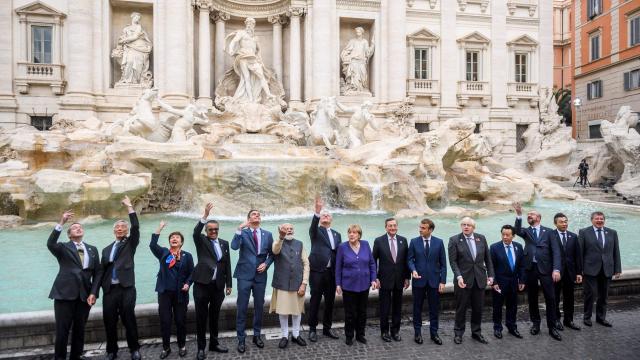Over the weekend, world leaders of the G20 tossed a coin into Rome’s Trevi Fountain to wish for good luck combatting climate change. By Monday, they were in Glasgow giving speeches as United Nations climate talks opened.
UK Prime Minister Boris Johnson borrowed from the Doomsday Clock imagery, noting that we’re “a minute to midnight” and even channelled Greta Thunberg’s “blah blah blah” speech. French President Emmanuel Macron noted the world’s biggest polluters don’t have policies in place to keep global warming to within 1.5 degrees Celsius, a target outlined in the Paris Agreement inked in 2015. The point of the Glasgow talks, he said, was for countries to “raise their ambition” because “that’s the only way of making our strategy credible again.” President Joe Biden apologised for four years of Donald Trump.
“None of us can escape the worst that is yet to come if we fail to seize this moment,” he added.
This is all well good and true. A flurry of commitments have come from countries since the start of the UN talks, ranging from combatting methane leaks from oil and gas infrastructure to stopping deforestation. But one key thing is missing among them: an explicit and credible plan to end fossil fuel extraction and use. And without that, the world will continue to play with fire.
There is simply no avenue for the world to meet the 1.5-degree-Celsius stretch goal of the Paris Agreement without winding down the fossil fuel industry as rapidly as possible. The Intergovernmental Panel on Climate Change issued a 2018 report looking at pathways to reach that goal. To do so without overshooting the temperature target or relying heavily on unproven carbon dioxide removal technologies and planting new forests to suck up carbon requires huge drops in fossil fuel use this decade. We’re talking a 78% drop in coal, 37% drop in oil, and 25% drop in gas as primary forms of energy, all while increasing nuclear capacity by 59% and renewables by an astounding 430%. By 2030.
Or take an International Energy Agency report. The group was created in part by Henry Kissinger in response to the 1970s oil crisis to essentially help ensure the OECD had a steady supply of fossil fuels. In other words, we’re not exactly talking hippies here. Yet their analysis of meeting the 1.5-degree-Celsius goal published earlier this year found world governments need to stop all new fossil fuel exploration next year (as in two months from now) to have a good shot at the target. Not only that, fossil fuels have to all but disappear from daily energy use by 2050.
“Net zero means a huge decline in the use of fossil fuels,” the report says. “They fall from almost four-fifths of total energy supply today to slightly over one-fifth by 2050. Fossil fuels that remain in 2050 are used in goods where the carbon is embodied in the product such as plastics, in facilities fitted with CCUS, and in sectors where low-emissions technology options are scarce.”
A growing number of countries have made 2050 net zero emissions pledges, which is great. But a pledge without a serious plan to end fossil fuels is worthless. The United Arab Emirates, for example, has pledged it will get to net zero by 2050 — and pump out more oil. Biden has pledged that the U.S. will cut emissions 50% over the next decade — while letting new pipelines go into operation and asking for more oil production. COP26 President Alok Sharma has endorsed the slogan “keep 1.5 alive” — all while the UK gets ready to approve a major new oil development in the North Sea. Major oil producers have made climate promises — and expressed scepticism about the IEA reports findings. This list goes on and on and on and, well, you get the point.
There are examples of what realistic plans to end fossil fuel production globally could look like. Denmark and Costa Rica have started what’s known as the Beyond Oil and Gas Alliance that’s focused on winding down fossil fuel extraction. Those countries are relatively small players in the extraction economy, though, but there’s nothing stopping big oil, gas, and coal countries from hopping on board. (Except money, I guess.)
Similarly, a collection of civil society groups have put together a Fossil Fuel Non-Proliferation Treaty. So far, 17 cities and sub-national governments have signed on as have more than 900 organisations and nearly 133,000 individuals. The treaty is modelled after a similar nuclear non-proliferation treaty and as Tzeporah Berman, international director at Canadian nonprofit Stand.earth who’s on the treaty steering committee, told Earther earlier this year that “we need international cooperation to get there because no one is going to do it on their own.”
While it’s true that the world will need pledges to reduce emissions tied to agriculture and deforestation and invest smartly in unproven carbon capture systems to see if they can be scaled up, there’s simply no substitute for winding down fossil fuel use as fast and as fairly as possible so that workers aren’t left in the dust. That world leaders have yet to make those types of pledges at this conference doesn’t mean whatever happens at Glasgow will be a failure per se. But the longer the world goes without a credible plan to wind down production of the most dangerous products on Earth, the more luck we’ll actually need.
